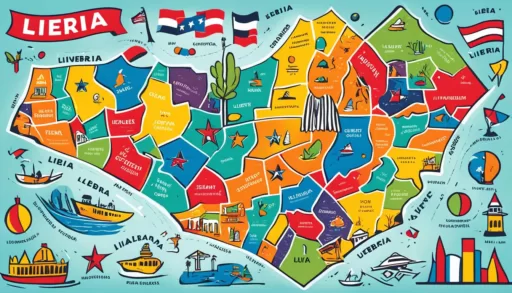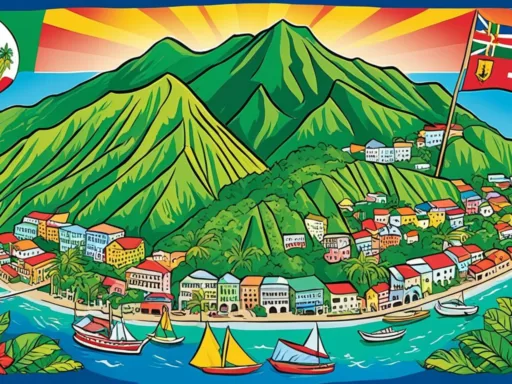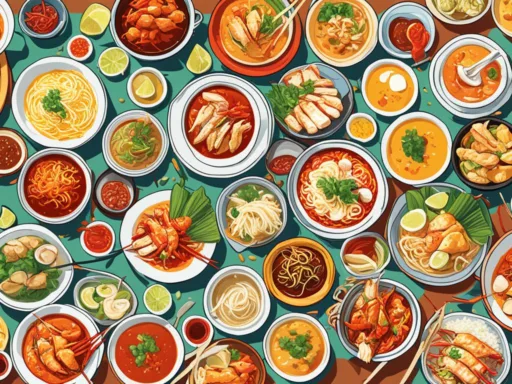The cultural canvas of Liberia is highlighted by its remarkable linguistic diversity, where the voices of over 20 indigenous languages echo throughout the nation, contributing to its dynamic multilingual footprint. As English stands as the official language, bridging communications across different ethnicities, it is the flourishing presence of Liberian Kreyol that often colors daily interactions among the populace. The existence of such a wide array of languages spoken in Liberia signifies not just the complex communication within its borders, but also the deep routes of cultural intertwining that form the Liberian identity. In exploring the lingual landscape of Liberia, one delves into a world where languages such as those from the Mande, Kru, Mel, and Grebo families offer a glimpse into the country’s rich cultural heritage and the storied past of its people.
Key Takeaways
- English is the official and unifying language in Liberia’s multilingual society.
- Liberian Kreyol, a form of pidgin English, serves as a lingua franca among Liberians.
- The indigenous languages of Liberia are categorized into four primary families: Mande, Kru, Mel, and Grebo.
- The linguistic landscape of Liberia showcases the nation’s rich history and cultural fusion.
- The preservation of Liberia’s diverse languages is vital for maintaining its unique cultural identity.
- Understanding the languages spoken in Liberia offers insight into the nation’s social fabric and traditions.
The Linguistic Landscape of Liberia
Liberia’s rich historical ties to the United States are omnipresent in its linguistic domains, with English towering as the official language of this diverse nation. This linguistic beacon facilitates governmental, educational, and media dialogues, fostering a unifying bridge amongst the tapestry of ethnic languages spread across Liberia.

Despite the English language dominance, the heart of Liberia’s identity is palpably felt through its ethnic languages. These languages, stemmed from various ethnic groups such as the Bassa, Kpelle, Grebo, and Kru, are not merely means of communication but are vessels of cultural expression, history, and legacy.
Liberia’s Official Language: English
In every corner of Liberia, from the bustling streets of Monrovia to the tranquil towns in the hinterlands, English serves as the cornerstone of official communication and education. It is the one language that ties the administrations to its people and the children of Liberia to the vast horizons of global knowledge.
Indigenous Languages and Ethnic Diversity
The symphony of ethnic languages across the Liberian populace is a melodious testament to the country’s kaleidoscopic cultural heritage. Each ethnic language enriches the collective narrative of the nation, solidifying Liberia’s socio-cultural foundation while diversifying its linguistic landscape. With over 30 languages spoken within its borders, Liberia is a proud display of ethnic linguistic heritage thriving alongside the binding force of English.
Languages Spoken in Liberia: Indigenous and Official Tongues
The tapestry of indigenous languages Liberia showcases within its borders is a testament to its rich cultural heritage. Each family of languages—the Mande, Kru, and Mel—not only provides a means of daily communication but also stands as a living archive of Liberia’s vivid past.
Mande, Kru, and Mel Language Families
Delving into the linguistic diversity of Liberia, the Mande languages emerge as a dominant voice in the northwestern region. This group includes languages like the Vai and Mandingo, which resonate the traditions and stories of the local communities. Meanwhile, the southwestern regions of Liberia emanate with the tonal nuances of the Kru language family. The Kru languages feature an array of dialects such as Bassa and Grebo, integral to the socio-cultural identity of their speakers.
Down the South, the Mel language family, which includes languages like Temne and Kisi, is spoken by communities living in close commune with Liberia’s verdant landscapes. These languages contribute to the intricate linguistic mosaic that Liberia proudly bears.

Gola: The Language of Liberia’s Original Inhabitants
The Gola language, deeply enmeshed with the identity of Liberia’s original inhabitants, is an emblem of endurance and historical richness. With its roots buried deep in the Libyan soil, the language of the Gola people is a cultural relic, revealing volumes about the earliest socities that flourished within what is today Liberia’s territory.
These indigenous languages Liberia holds dear are not just tools for daily communication but stand as proud beacons of cultural identity. In every phrase of the Mande, every intonation of the Kru, the enchanting melodies of the Mel languages, and the storied past of the Gola language, the ancestral wisdom and resilience of Liberia’s diverse communities are magnificently echoed.
The Emergence and Role of Liberian English Varieties
A walk through the linguistic marketplaces of Liberia reveals a bricolage of English lexicons tinted with both colonial resonances and contemporary local nuances. The Liberian English spectrum presents distinct varieties that serve as markers of identity as well as mediums for cross-cultural communication within this vibrant West African nation.
Standard Liberian English and Liberian Settler English
The echoes of American English resonate within the cadences of what is known as Standard Liberian English, a testament to the historical Americo-Liberian settlers’ influence, who laid down the linguistic bedrock of today’s Liberia. This variant retains the flavor of an era gone by through archaic expressions that now pepper the modern Liberian speech.
Liberian Kreyol and Pidgin Forms
Interwoven deeply in the social fabric is the ubiquitously spoken Liberian Kreyol. Birthed from African American Vernacular English and shaped by the Caribbean English influence, this vernacular form serves as the communal thread linking various Liberian communities. Pidgin English Liberia, along with variations such as Kru Pidgin English, emerges from the need for interethnic dialogue, not just within Liberia but also in exchanges with other West African regions.

The evolution of these English varieties underscores their dynamic adaptability. From the Kpelle language, spoken by the largest ethnic group, to the freed Caribbean settlers’ linguistic contributions, every word and phrase is imbued with historical resonance. It is through this linguistic evolution that Liberia continues to tell its story—a narrative of unity, diversity, and adaptive creativity.
| English Varieties | Origin | Characteristics | Usage |
|---|---|---|---|
| Standard Liberian English | Americo-Liberian Settlers | Archaic American Expressions | Formal communication |
| Liberian Kreyol | African American Vernacular English | Vernacular, widespread use | Everyday conversation |
| Kru Pidgin English | Trade and interethnic interactions | Simplified grammar and vocabulary | Trade, intergroup communication |
| Caribbean English influence | Caribbean Settlers | Creole lexical items | Cultural identity expression |
In conclusion, Liberian English, in all its variety, acts as a bridge not only to the country’s colonial past but also a means for present and future generations to forge their own identity amidst a world of increasing linguistic plurality.
Cultural and Linguistic Influences on the Liberian Vernacular
The linguistic tapestry of Liberia is woven with a variety of dialects and accents, each bearing the hallmark of the nation’s multifaceted ancestry. The vernacular tongue of Liberia has evolved under the substantial influence of the Americo-Liberian settlers and the cultural exchanges resultant from centuries of interaction with different communities.
As linguistic threads from the rich tapestry of African American Vernacular English interlace with local expressions, they contribute to the vernacular lexicon that is distinctly Liberian, yet globally resonant. In examining Liberia’s vernacular, one must acknowledge the historical impact and continued influence of several key languages and creoles.

The Impact of Americo-Liberian Settlers
When delving into the linguistic impact of Americo-Liberian settlers, one uncovers a profound fusion of language and culture. The settlers, primarily descending from the Southern United States, carried with them linguistic constructs that have left an indelible imprint on Liberia’s language use today. This blend of English, with its archaic Southern twinges, and cultural elements from their African heritage, laid the groundwork for what would become the nation’s vernacular.
African American Vernacular and Caribbean Creole Contributions
Adding to the melange are the inflections and idioms of African American Vernacular English, which, during the formative years of Liberia’s establishment, were introduced by freed slaves. This vernacular, coupled with elements of Caribbean Creole languages brought by settlers from the islands, enriched the linguistic landscape, allowing for a distinct Liberian Pidgin English to emerge.
The linguistic exchange did not end with English derivatives; indigenous languages such as the Bassa language, the Gio language, the Maninka language, and the Vai language play an integral role in shaping the country’s collective voice. The mingling of these languages with the Americo-Liberian impact and the Caribbean Creole languages has produced a vernacular replete with nuanced meanings and a distinctive communicative style.
| Influential Language | Origin | Linguistic Characteristics | Impact on Liberian Vernacular |
|---|---|---|---|
| African American Vernacular English | United States | Phonological and grammatical features from Southern American English | Core elements integrated into Liberian Kreyol and Settler English |
| Caribbean Creole Languages | Caribbean Islands | Creolized forms of English with African linguistic substrates | Influenced the development of a Liberian Pidgin, rich in cultural expressions |
| Bassa Language | Liberia | Niger-Congo language family, Kru group | Contributes idioms and vocabulary to Liberian vernaculars |
| Gio Language | Liberia | Mande language family | Plays a role in everyday communication and interethnic linguistic exchange |
| Maninka Language | West Africa | Mande language family, tonal language | Influences the vernacular especially in regions of Mande-speaking populations |
| Vai Language | Liberia and Sierra Leone | Mande language family, uses Vai syllabary | Adds to Liberia’s linguistic diversity and the vernacular scriptural tradition |
The lingua franca of Liberia has been seasoned by a spectrum of influences, culminating in a vernacular that holds the essence of diverse ancestries. The blend of Americo-Liberian language impact with the vibrancy of African American Vernacular English and the syncopated rhythms of Caribbean Creole languages, against the backdrop of indigenous linguistic traditions, is what makes the Liberian vernacular unique and worthy of appreciation and study.
Conclusion: The Essence of Liberia’s Language Landscape
The linguistic diversity in Liberia is not merely a characteristic of its society, but the lifeblood of its heritage. This array of languages, including English and over 20 distinctive indigenous dialects, along with creoles and pidgin forms, embodies Liberia’s complex history and cultural identity. Each language spoken weaves into the nation’s story, contributing its unique narrative and cultural hues to the larger picture. The task of language preservation in Liberia stands as a monumentally important one, for it is these languages that harbor the legacy of entire communities and are foundational to the continued growth and unity of the country.
Liberian language heritage, with its historical depth and vibrant expressions, is an invaluable treasure that must be safeguarded. As the world becomes increasingly interconnected, Liberia stands at a crossroad where language preservation becomes pivotal. By valuing and promoting the nation’s multilingual legacy, Liberia not only honors its past but also enhances its citizens’ sense of identity and belonging. Such an inclusive approach to the nation’s multitude of languages promotes understanding and communal harmony, fortifying the rich tapestry of Liberian society.
Moving forward, the commitment to fostering linguistic diversity in Liberia also poses an invitation to the global community — to recognize the intrinsic value of cultural pluralism. In the embrace of its language heritage, Liberia demonstrates resilience and adaptation, setting a precedent for others in terms of cultural preservation and the celebration of diversity. It stands as a beacon to the world, emblematic of how linguistic heritage can unite a nation and empower its people.
FAQ
What languages are spoken in Liberia?
Liberia is home to more than 20 indigenous languages across its various ethnic groups. English is the official language, with widespread use in business, education, and government. Other prevalent languages include Kpelle, Bassa, Gio, Maninka, and Vai. Moreover, Liberian Kreyol, or Vernacular Liberian English, functions as a lingua franca among different language speakers.
What is the official language of Liberia?
The official language of Liberia is English. Given the nation’s history with the United States, English is used as the medium of instruction in school, the legal language within the government, and the business sector, as well as by the media.
How does the ethnicity of Liberia affect its language diversity?
Ethnic diversity in Liberia plays a significant role in its language diversity with the presence of various ethnic groups like the Bassa, Kpelle, Grebo, and Kru, who each have their own distinct languages. These indigenous languages contribute to the rich cultural fabric of the nation.
What are the main language families in Liberia?
Liberian indigenous languages are categorized into four primary language families: Mande, Kru, Mel, and Gola. The Mande languages, including Vai and Mandingo, are largely spoken in the northwest, Kru languages such as Bassa and Grebo are prevalent in the southwest, and Mel languages like Temne and Kisi are found in the southern regions. Gola, an indigenous language, is believed to be one of the original tongues of the area.
What is the significance of Gola in Liberian linguistics?
The Gola language is considered significant as it’s believed to be one of the earliest languages spoken by the original inhabitants of Liberia. It’s an integral part of the country’s linguistic heritage and plays a role in the cultural representation of Liberia.
What are the differences between Standard Liberian English and Liberian Settler English?
Standard Liberian English is similar to American English and is primarily used by descendants of Americo-Liberians, including certain archaic expressions. Meanwhile, Liberian Settler English is a term occasionally used to describe English as used among settlers from America, characterized by its historical ties and slight variances from contemporary Standard Liberian English.
How did Liberian Kreyol develop and what is its role in society?
Liberian Kreyol, also known as Vernacular Liberian English, developed from a mix of African American Vernacular English and elements of English spoken by the Americo-Liberian settlers. It serves as a vernacular lingua franca, facilitating communication among people of different linguistic backgrounds in daily life.
How have Americo-Liberian settlers influenced Liberian language?
Americo-Liberian settlers have influenced the Liberian language by introducing elements of Southern American English and Caribbean Creole into the local speech patterns, leading to the development of a distinct Liberian creole rich in cultural nuances.
What contributions have African American Vernacular and Caribbean Creole made to the Liberian vernacular?
African American Vernacular and Caribbean Creole have contributed significantly to the Liberian vernacular by integrating their expressions and structures. These have merged with local languages to form a unique creole language used widely throughout the nation.
Why is linguistic diversity important to Liberia’s heritage?
Linguistic diversity is a vital part of Liberia’s heritage as it reflects the country’s multifaceted ethnic roots and history. It is an asset that fosters a sense of national identity and unity among its diverse population, while also serving as a cultural cornerstone and a bridge connecting the nation’s past with its present.






